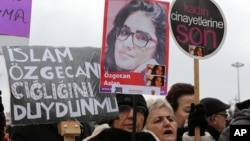Women and activists in Turkey have taken to the streets in nationwide protests, coupled with a massive Twitter campaign, in response to the murder of a 20-year-old student in an attempted rape.
Rallying around a case that is highlighting the wider problem of violence against women in Turkey, around 15,000 people gathered to protest the murder of Ozgecan Aslan in her home city of Mersin on the country's Mediterranean coast.
According to police, Aslan was murdered in a failed rape attempt while returning home. Her body was found mutilated and burned.
Rights groups claim as many as five women a day are murdered in Turkey.
Political scientist Cengiz Aktar of Istanbul’s Suleyman Sah University says this latest murder could prove to be a tipping point for many in Turkish society over the scourge of violence against women.
"It created a huge wave of protests in the country, probably due to the overdose of violence against women. One noticeable reaction through the campaign in social media was triggered by an associate professor in Istanbul who called upon female citizens of this country to tell their stories on harassment. As we are talking now, it has reached one million accounts and stories," says Aktar.
Under the Twitter hashtag #sendanlat, or #tellyourstory, women across Turkey have been expressing their experiences of violence and harassment.
Women’s rights campaigner and sociologist at Istanbul’s Bosphorus University, Nukhet Sirman, says the social media campaign is an important breakthrough in exposing the scale of the problem of violence against women.
"There is not a single women in Turkey who has not experienced or has not feared the experience of being harassed by men. In that sense it has been very important for women to come out with their experiences. Very well known actresses, professors, everybody came out with these kinds of stories. In fact, I was interviewed by another newsgroup and basically I asked the woman who was interviewing me whether she actually has been harassed she said, 'of course,' and this is how widespread it is," says Sirman.
Law not implemented
The latest available official figures, show between 2002 and 2009 the murder rate of women increased by 1,400 percent in Turkey. The last figures for assaults on women in 2013 is estimated at 28,000.
Senior researcher for New York-based Human Rights Watch, Emma Sinclair Webb, says the government’s commitment to tackling the problem is questionable.
"There is an endemic problem of violence against women. A couple of years ago, Turkey signed up for a big Council of Europe Convention on violence against women. Then Turkey changed its law on protection of women and family and produced a good law. There is a wide variety, different types of measures that can be taken to combat violence against women. Now the big problem is the law was never implemented properly," says she.
Webb says in the past few years there has been an increase in conviction rates for men murdering women, along with more severe penalties. Three men have been charged with Aslan’s murder.
President Recep Tayyip Erdogan has been quick to condemn the killing and promised he will press for the heaviest penalties against anyone convicted.
But Erdogan has a troubled history with women’s rights and advocacy in Turkey. Shortly after winning the presidency, after 12 years as prime minister, he sparked outrage by saying women and men could not be equal because it “goes against the laws of nature”.
He has also proposed limits on abortion and caesarean sections, and his deputy prime minister, Bulent Arinc, made comments suggesting women should not laugh in public, which prompted a social media explosion of women sharing images of themselves laughing.




